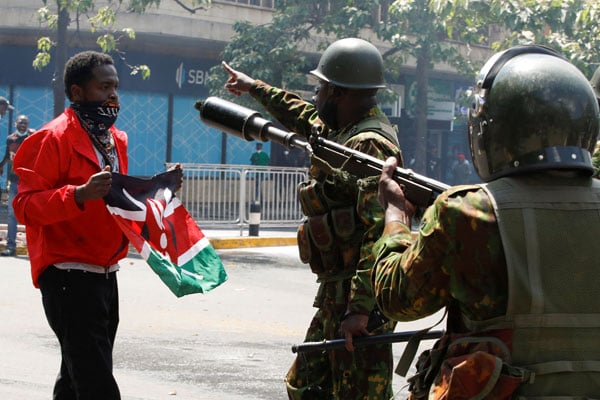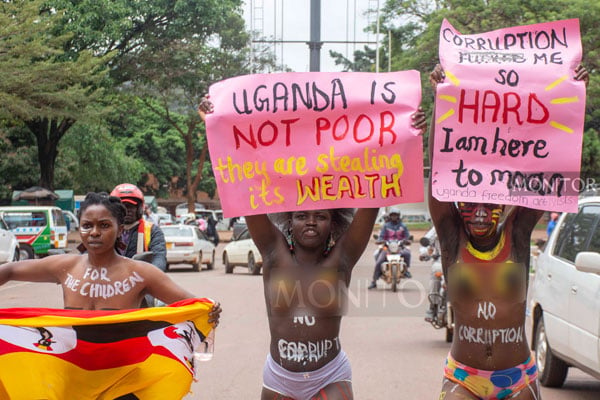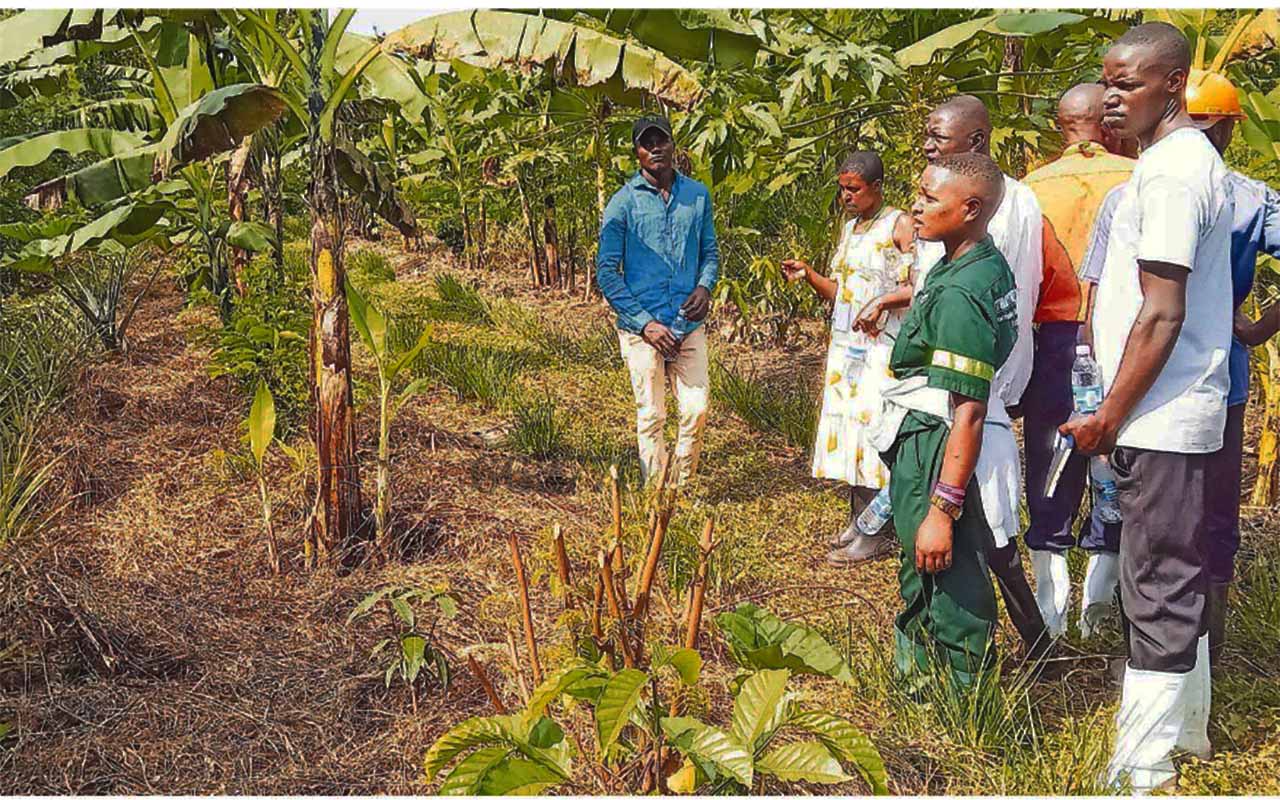
Police officers arrest activists outside Uganda’s Parliament on September 02, 2024 as they protested the continued corruption and inadequate support for the victims of the August 10 Kiteezi landfill collapse that left 35 bodies recovered and scores missing. PHOTO/ ISAAC KASAMANI
On Monday as the police in Kampala were battling young anti-corruption activists who staged a half-nude protest on the streets of Kampala, the Johannesburg-based Ichikowitz Family Foundation (IFF) was releasing the findings of the 2024 African Youth survey that revealed that up to 60 percent of youth in Africa were contemplating leaving the continent.
The United Nations High Commission for Refugees (UNHCR) has in its previous global trends reports blamed such ideas on conflicts, persecution, human rights violations and instability.
The findings of the 2024 African Youth Survey which was conducted in 16 countries, however, revealed corruption has emerged as the new driver.
The British Broadcasting Corporation (BBC), which carried the story on its 7:01 GMT news bulletin of Tuesday quoted Mr Ivor Ichikowitz, the industrialist and philanthropist, who is also head of the IFF, saying the fear of corruption was widespread among the 5,604 respondents aged between 18 and 24.
“Four in five people surveyed are worried of corruption in their countries and they are not just worried about corruption in government, they are worried of corruption in business, corruption in the police, corruption in churches, and corruption in their social environments. That is very worrying,” Mr Ichikowitz told the BBC.
The respondents drawn from Botswana, Cameroon, Chad, Congo Brazzaville, Côte d’Ivoire, Ethiopia, Gabon, Ghana, Kenya, Malawi, Namibia, Nigeria, Rwanda, South Africa, Tanzania and Zambia did not believe that the authorities were doing enough to fight corruption.
"Most of all, they don't believe their governments are doing enough to address this scourge and, because of it, almost 60 percent are looking to emigrate in the next five years," it said.

Police officers argue with a protestor during a demonstration against Kenya's proposed finance bill 2024/2025 in Nairobi, Kenya, June 25, 2024. PHOTO/REUTERS
According to the outcome of the report, the respondents pointed to corruption as the “single greatest hurdle” to the achievement of their own potential and a better life.
Uganda may not have been on the list of the 16 countries whose youth were interviewed as part of the survey, but some of the streets of Kampala have been the venues of demonstrations to protest alleged high-level corruption.
More than 40 youth were arrested for their roles in the July 23 and July 25 attempts to march to Parliament.
Then Monday this week saw the semi-nude demonstrations in which the participants painted their bodies with several anti-corruption messages. Those demonstrations point to the extent to which sections of the population have become exasperated with corruption. A person who can protest in the nude, some Ugandans say, would most probably be ready to leave the country.

Activists carry placards as they shout slogans outside Uganda’s Parliament on September 02, 2024 during a protest against the continued corruption and lack of what they described as government help for the victims of the August 10 Kiteezi landfill collapse that left 35 Ugandans dead and several missing. PHOTO/ ISAAC KASAMANI
Mr Livingstone Sewanyana, the executive director of the Foundation for Human Rights Initiative (FHRI), says the findings of the African Youth Survey ring true with what is going on in Uganda.
“Corruption is eating into the entire public realm. Services cannot be delivered unless someone parts with money and that cuts across the board whether it is accessing justice, whether it is just having a simple road fixed, for any service now. If you do not have money you cannot get any service,” Mr Sewanyana says.
Mr Emmanuel Dombo, the director for communication at the Secretariat of the National Resistance Movement (NRM), blames the situation on a bad education system and bad elected leaders who he claims have abdicated their responsibility to the people.
“We are dealing with people who have only been trained to look for jobs and the jobs are not there. And we have some leaders who prefer to do things for themselves instead of doing them for the population. We have seen this among the Members of Parliament. We have seen this at the districts by the people who have been elected chairpersons LC5,” he says.
Mr Dombo will not say why the NRM, which has been in power for close to four decades, has not changed an education system that has not created more jobs or put in place policies that will enable the economy generate many more jobs than it is doing.
Mr Sewanyana, however, thinks that it is well beyond the education systems and selfish leaders. It is as much about policies as it is about governance. That, he says, has impacted all levels of society leading to despondence and a desire to flee.
“The extent of unemployment among the youth is alarming, but it is not just about the youth. The middle class is underemployed. Most businesses are not yielding profits because taxation levels are so high and unrealistic,” Mr Sewanyana adds.
Entire sections of the population are despondent, he adds.
“Eight out of the 10 telephone calls you get every day are of people asking for help. They either need money to pay medical bills or their children have been thrown out of school because they cannot afford the fees. Others have been thrown out of the house because they failed to pay rent. People no longer see a future here. Even the middle class would want to leave if given the opportunity to leave,” Mr Sewanyana says.
A gloomy image he paints, but Mr Dombo argues that there should be no cause for relocation or despair.
“That is desperation. Why? Is there cause for desperation? Corrupt people have existed since time immemorial, but the world has not ceased to exist. The countries where they wish to relocate were here and fleeced Africa from the bone marrow,” Mr Dombo argues.

Three young activists in the dock at Buganda Road Chief Magistrate's where they were charged with being common nuisance and remanded to Luzira Prison after staging a nude protest near Parliament on September 2, 2024. PHOTO/ JULIET KIGONGO
Mixed signals
Mr Godfrey Kabyanga, the State minister for Information and Communications Technology and National Guidance is one of those who have been calling for concerted efforts in the fight against corruption, but he is at the same time quick to condemn those who decided to demonstrate while in the nude.
“Let us fight corruption all of us. Let us gather evidence and we bring it forward. We arrest the corrupt and have them prosecuted, if they are found guilty they are charged and they serve their sentences, but going nude, that one will not fight corruption. Not at all,” Mr Kabyanga argues.
The problem though, is that different government officials have been giving different signals around the fight against corruption.
On June 2, 2023, for example, the Inspector General of Government (IGG), Ms Beti Olive Kamya, called on the victims and those who suffer most when corruption occurs to fight the vice from the front.
“For us seated this side, me and Mr (Moses) Kamabare, is going to die in Mulago hospital because there is no medicine. I am telling you the truth. If there is no medicine, he will call the President, the President will put him on the plane and take him to America. He is not and I am not a victim of corruption. You must know who the victim is and start fighting as a victim. You will die in Mulago hospital because you do not have the option of going to Nairobi,” Ms Kamya said. Mr Kamabare is the general manager of the National Medical Stores.
Ms Kamya did not define the tactics that the victims would employ in the fight.
Those familiar with Ludwig Pastor's The History of the Popes from the Close of the Middle Ages are familiar with his belief that “when the existence of the Church is threatened, she is released from the commandments of morality”.
Looked at from Pastor’s lens, the march to Parliament and the semi-nude protests were the victims’ heed to Ms Kamya’s call to action, albeit with their own tactics. The brutal response of the police and the condemnation by the likes of minister Kabyanga have, however, left anti-corruption activists and sections of the public in no man’s land.
That has reignited debate about the government’s commitment to fighting corruption, but Mr Dombo defends the government, saying some subversive forces had tried to use the protests to cast the government in bad light.
“Young people are vulnerable. They do not have jobs and cannot access good quality life so they may be exploited by people who may not necessarily wish us (Uganda and the government) well. They may see this as another way of inciting the public in order to fight against its own leaders,” Mr Dombo says.
Whichever way one looks at it, it would be understandable that people who are increasingly finding themselves in a situation where they feel that they do not have a stake in the country would rather move on.

A protester attends a demonstration against the Finance Bill 2024/2025 in Nairobi, Kenya, on June 25, 2024. PHOTO | REUTERS
Numbers in fight
There are already quite a high number of Ugandans living outside Uganda. Last month Uganda was listed among the top five of 20 African countries whose young populations had chosen to leave.
Uganda was number two in Africa and number 12 in the world with a negative migration of 136,000 in 2023. According to a country profile published by the International Organisation for Migration (IOM), the number of Ugandans who have been living has been on the increase since 2010.
The profile indicates that there were 786,000 Ugandan emigrants by 2015, which had risen from 731,800 in 2010. With the recent influx into world where Ugandans provide cheap labour as security guards, maids and construction the number might have by now exceed the one million mark.
According to IOM, those movements have been driven by mostly economic reasons.
“The most important factor causing Ugandans to migrate within and outside their country is employment, as economic opportunities in Uganda are limited,” the profile says.
Those in government do not seem to agree with the conclusions of the IOM profile on Uganda. Mr Matia Kasaija, the minister of Finance while speaking at Namanve Industrial Park on August 24 said it beats his understanding that many youthful Ugandans are seeking opportunities abroad yet Uganda has whatever is necessary for one to succeed in any endeavour.
“To run away from this kind of weather and go (abroad) and freeze in winter? I cannot quite understand that,” Mr Kasaija says.
Mr Sewanyana does not agree with minister Kasaija.
“I think the minister was daydreaming. He was either completely unserious or diversionary when he made such statements. He is simply refusing to accept failure on the part of the government,” Mr Sewanyana says.

A plain-clothed security operative drags a female protester during anti-corruption protests in Kampala on July 23, 2024. PHOTO | ABUBAKER LUBOWA
Broken state?
Mr Sewanyana says the total sum of it is that the government has failed to fix the country’s economic and political problems and also failed to deliver services to the people.
“We have a weak state that cannot deliver services. Look at the health infrastructure, the education infrastructure, the road infrastructure and even other services like electricity. Look the medical interns who cannot be deployed because there is no money. All the money is going to the political elite in the ranks of government, which is depriving the public the little that would have gone towards ensuring service delivery,” Mr Sewanyana argues.
The situation, he says, is exacerbated by the fact that Parliament, which is supposed to oversee the executive arm of government, is increasingly coming across as corrupt.
Mr Kabyanga dismisses Mr Sewanyana’s conclusion that Uganda is a weak State. He says Uganda is only experiencing economic hardships similar to those that are being experienced by other countries on the continent.
“The whole of Africa is going through all of economic hardship. What is happening in Kenya? Has Kenya collapsed? Is Zambia also a weak state? We are going through economic situations just like the others, but things will change for the better,” Mr Kabyanga says.
“Youth and Migration: Perspective of African Countries” which was authored by Lesego Selotlegeng-Mbe notes that most of the estimated 3.6 million Africans residing abroad are highly educated professionals.
Ugandans constitute a big percentage of that number. The migration, the paper says, has resulted into the loss expertise in vital sectors of the continent’s economy.
One hopes that God hears minister Kabyanga’s prayer that things improve to stem the rate at Uganda has been losing both manpower and expertise.






